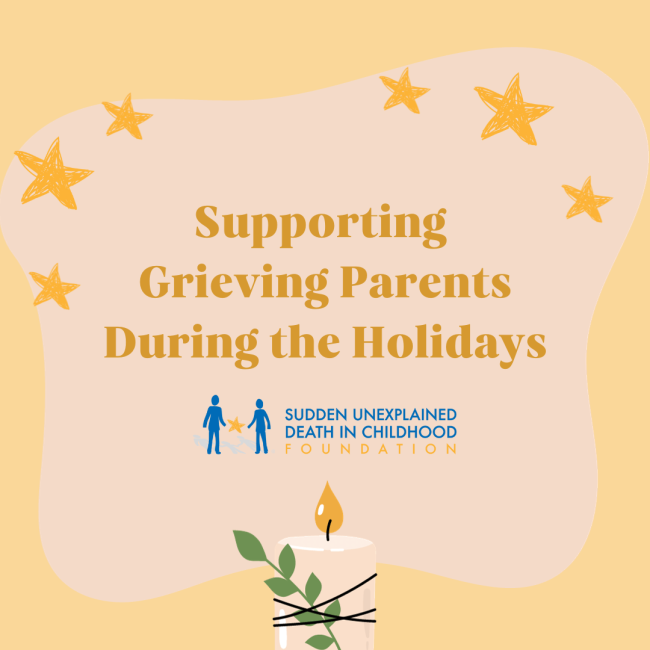01 Nov Supporting Grieving Parents Through the Holiday Season

During the stretch from Thanksgiving to New Year’s Day, we step into a season of warmth, celebration, and togetherness. However, for parents who bear the heavy weight of grief after losing a child to sudden unexplained death in childhood (SUDC), this time brings forth unique and profound challenges. As a friend or family member your role can be pivotal, as you hold the power to provide a compassionate and empathetic presence during this emotionally charged season. The following insights offer gentle wisdom on how to navigate the holidays with grace, focusing on heartfelt tips for the various dimensions of supporting those who have lost a child and yourself.
Supporting Grieving Parents During the Holidays:
- Listen Actively: Example – Sit with them and say, “I’m here for you. If you want to talk or just sit in silence, I’m with you.” This shows your willingness to be a listening ear without pressure. The same letters in SILENT are the same letters in LISTEN.
- Respect Their Choices: Example – If they choose not to attend a holiday event, respect their decision, and offer to bring a meal to their home instead, saying, “We understand it’s tough, and we’re here to support you in whatever way you’re comfortable with.”
- Help with Practical Tasks: Example – Offer to help decorate their home for the holidays, cook a meal, or watch their other children while they take a break. This can be especially meaningful during a time when energy is low.
- Remember Their Loved One: Example – Share a cherished memory of their child who passed away, saying, “I remember when [child’s name] did [specific memory]. They brought so much joy to our lives, and we’ll keep their memory alive this holiday season.”
Supporting Yourself and Other Friends and Family:
- Educate Yourself: Example – Read literature about grief and loss to better understand what they are going through. This knowledge will enable you to offer more empathetic and informed support.
- Seek Your Support System: Example – Reach out to a close friend and say, “I’m finding it challenging to support my grieving friend during the holidays. Can we talk?” Sharing your feelings can help you cope with your emotions.
- Practice Active Listening: Example – When your grieving loved one shares their feelings, sit with them and say, “I’m here for you, and I’m listening. You can share as much or as little as you want.” This creates a non-judgmental space for them to express themselves.
- Prioritize Self-Care: Example – Take time for yourself by engaging in activities that bring you joy. Tell your grieving friends, “I’m going to take some time to recharge and take care of myself so I can continue to support you effectively.”
Navigating the Holidays with Compassion and Understanding:
- Check-In Regularly: Example – Send a simple text message, “Thinking of you during the holidays. How are you holding up?” Regular check-ins show your ongoing support.
- Plan Thoughtful Gestures: Example – Send a heartfelt holiday card with a handwritten message expressing your love and support, include their child’s name on family cards, or prepare a meal to drop off at their doorstep to make their day a bit easier.
- Create Inclusive Celebrations: Example – If hosting a holiday gathering, let them know, “You’re welcome to join us, but there’s no pressure. We understand this season is tough for you, and we respect your choice.”
- Support Their Coping Strategies: Example – If they decide to start a new tradition, offer encouragement, and say, “I admire your strength in creating new ways to honor your child. I’m here to support you in making it meaningful.”
In embracing these strategies, you hold the power to be a beacon of support for grieving parents throughout the holiday season. Your understanding, empathy, and unwavering presence can be a lifeline during this challenging time. Keep in mind, grief doesn’t pause for holidays, but your compassionate approach can make it a bit more bearable for all. Remember that supporting both the grieving parents and you is not just important – it’s essential, for grief has a ripple effect, touching the lives of everyone involved.



